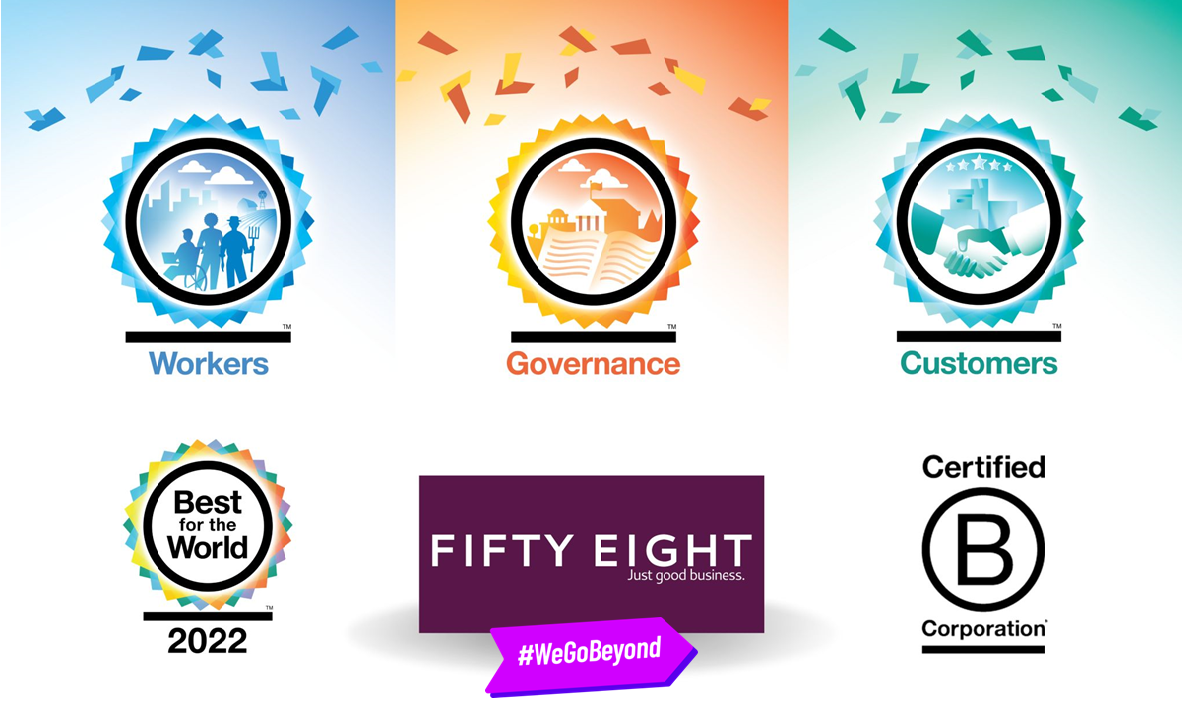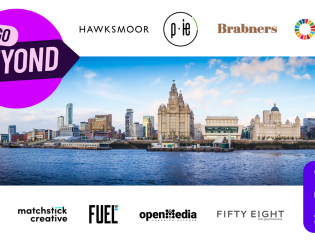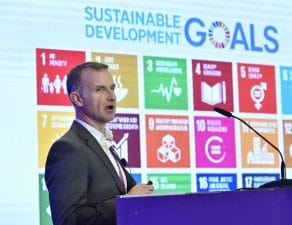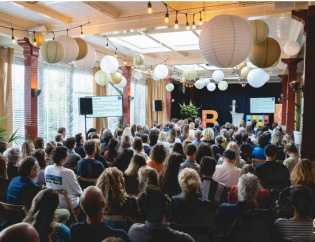
For B Corp Month, we couldn't think of a better way of showcasing all that is good about the movement by showcasing Liverpool's best B Corp!
For qualification, by best we mean they were the UK's highest-scoring B Corp when they were certified.
Can we kindly introduce the fabulous Fifty Eight!
Fifty Eight achieved Olympian heights scoring 156.6 on their B Impact Assessment, elevating them to not only local royalness but also as 3x recipients of 'Best for the World' for two years running across all B Corps globally! See, we said they were good.
We sat down with Fifty Eight's Co-Founder Quintin Lake, whilst also surrounded by his team to add to the pressure, to catch up and have a cosy chat about their B Corp journey.
Fifty Eight partners with organisations and individuals throughout the value chain to achieve work that enhances the quality of life, free from exploitation. They support organisations through a combination of training, tailored service and support, research, and development of practical solutions to the challenges of modern slavery facing companies and workers.
This is a longer read than usual, so grab a drink, put your phone on silent and read on.
How would you describe B Corp to someone and why you chose to certify?
"There are lots of different reasons to start this journey. To me, B Corp describes business at its very best. It's a way to know what a genuinely 'good' business looks like when having a positive impact on the environment and the people. So that's the thing that at first caught our attention to it. That was how we wanted our business to work and lock that in. Then suddenly, we discovered this thing called B Corp that described how we felt and gave us a way of describing that to other people.
We're a business that is focused on having a positive impact. B Corp is all about doing better business. If we work with you, we're working with you as a client to make a good impact and that is the same if you're a supplier. It's not just a certification, it's also for business improvement. As you go through the process, the business can really understand all the different aspects of being good, ethical and responsible."
How tough did you find the B Impact Assessment?
"I think it made us more aware of what we were actually doing and affirmed to us actually, that the stuff that we're already doing was having the kind of impact we wanted it to."
What did the certification process make you look differently at?
"I think maybe trying to recruit locally at the time. I would say we had probably thought about it but hadn't given it as much consideration as we should have. But really looking at local talent was needed as sometimes you focus on, who's the most talented person - full stop, but we needed to change the way we approached this and look at how can we find talented people locally."
Since certification, is there anything that you've identified as an improvement opportunity?
"At the time we submitted, we were scoring low on environmental impacts as we didn’t have a lot of data. In saying that though, that happened during COVID. When all travel and other things got in the way. It is our ambition for this year to focus on that and to improve that part of the business. We have started that with the carbon footprint calculation with you [2030hub]. We're going to use that as a benchmark to see what we can do as much of our team is remote and an area where we need to build our internal capacity."
How hard was the Mission Lock process?
"The purpose bit for us is something that is absolutely core to who we are as a business, but to then articulate that formally at Companies House is a whole different step. Initially, it was one of the things that delayed our certification. As we looked at the guidance around it, we felt like it was too complex, or was aimed at larger companies. We didn't do it for a long time, because it felt like it was going to be this long, difficult process. In the end, it was very quick and simple."
Were there any other eureka moments the BIA identified?
"One surprise learning for us was language-based about 'underserved populations'. This is a big focus in the Community section of questions if you if your product or service serves underserved populations, and I guess we'd never thought about it in that language until they came up in the assessment. One of our technology solutions is called Just Good Work, Its entire focus is on migrant workers and the lack of decent jobs available when they can get work they may be sending money back home. So, there is inherently an underserved population. We've never really thought about it as being underserved. That opened up a whole new dizzying array of questions."
Is that what triggered your high score?
"It was one of the big things that triggered the score increase. No question about it. It was a useful process to have gone through because it gave us a whole other language to articulate the impact that we have. So just going through that process, it absolutely helped our score, but then having to answer all of those questions, we then had all sorts of other language and things that we could then use to explain it in other contexts."
How did you, as a small company begin to project manage the process?
"We broke it up, each looked at different areas. We each chose specific questions and looking at them in smaller bits definitely helped us focus and identify the correct evidence or any insight data. We also decided to take our time and not rush. There is much to mentally process and time for reflection and interpretation was very much needed."
How long did it take you to certify?
"I can't remember exactly but it was at least nine months. The bits we thought were going to take us the longest which we put off, like the leader certification, or the Articles of Association didn't take very long, it was the evidence finding that definitely impacted the timeline. It was kind of like a driving test where we submitted it and failed the first time so we tried again with all the evidence. I was a bit surprised by how much evidence then they looked for, but in a good way."
So, your final score was over 156 points and you were the highest-scoring B Corp in the UK?
"Yes, first of all, it was an affirmation for the team just to be certified, but to have had the highest UK score, was a huge boost for us. It's like we said at the beginning, that was how we wanted to run the business in a meaningful way. Having an outside independent assessor confirm that and alongside some well-known brands and much bigger companies was incredible."
And you also ranked high enough for three 'Best for The World' categories (Governance, Customers, Workers)
"We were also shocked by that. That in itself is also a wonderful spur to keep trying to do more for sure.
For example, a question that says 'Do all of your staff have access to health care?’ or ‘Do your staff have access to a living wage?'. On the face of it should definitely be yes. But as some of the team are in Uganda and Macedonia and other places, we have to figure out and make sure that even with temporary staff or contractors are paid sick pay and pension and all of those things are built-in to a salary. But how we evidence that it makes you really stop and look."
What's happening in the next 12 months?
"We're focusing on Just Good Work this year, the UK is one big area, but there are also projects in the Gulf, in Malaysia, and Mexico. Indonesia and Taiwan in particular, are two big focus areas. I think Just Good Work is trying to continue to be made available to more workers and workplaces. Late last year was a really big jump from around 10,000 to just over 40,000 people using it. This year, we want to see that really grow and be used."
How will you get more people to use it?
"In many ways. We want to make it available more widely geographically and work with more sector bodies. We worked with seasonal workers this year in construction, hospitality, manufacturing and agriculture in Malaysia, for example. We just finished a four-year child labour research project last year, and this year are trying to build on some of the research from that. We aim to work with companies and investors on child labour due diligence because the way that it happens at the moment is pretty broken. We did some stuff with the Global Child Forum last year, that's also a big focus this year."
If they can, your business can too. Step closer to the B Corp movement by heading to www.bcorporation.uk - or asking us for advice - and see what records you can set!
We'd also like to take this opportunity to thank Quintin, Angela and all at Fifty Eight for your leadership, global impact and constant support for smaller local good businesses across the north west. It has been a privilege to have had an insight into your pioneering story.
UPDATE: Great news! Since our interview Fifty Eight have been awarded support from Liverpool City Region's Growth Platform High Growth Fund to springboard their ambitious goals. The best is about to get even better!
Follow Fifty Eight on LinkedIn and Twitter for their own updates.
#WeGoBeyond
#BCorpMonth



